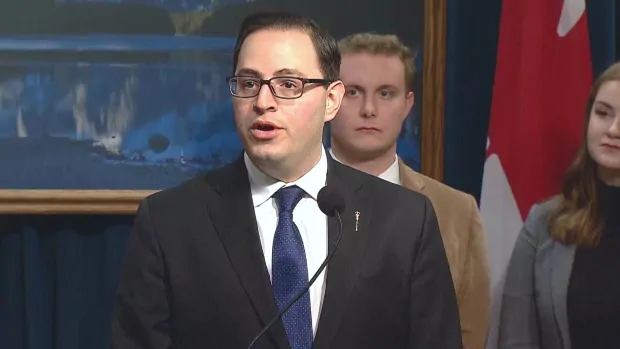Alberta’s Advanced Education minister says he is willing to help Athabasca University with whatever it wants — including money — to relocate 500 employees to the small town that’s the school’s namesake, but says the university has not stepped up.
“I’ve offered to provide any kind of assistance that the university needs. They haven’t asked for any,” Demetrios Nicolaides said in a weekend interview.
Nicolaides said his department previously asked the university for a concrete plan by June 30 to expand the physical presence of the school in the town of 2,800.
“What I got on June 30 did not contain any financial asks, and did not even contain any kind of financial information or cost implications associated with moving [staff],” he said. “So in the absence of any details from the university, we’re going to have to take a step forward.”
Nicolaides’ comments come as the standoff between him and university president Peter Scott becomes increasingly confrontational, set against a looming deadline that holds the fate of the school in the balance.
The two sides have been debating the role and mission of Athabasca University for months. It is Canada’s largest online university, hosting 40,000 students linked up virtually across Canada and beyond with instructors.
It was moved from Edmonton to Athabasca, 145 kilometres north of the provincial capital, almost 40 years ago to provide distance learning and help rural economic growth.
Therein lies the rub.
Over time, the school’s on-site staff has dwindled as more began working remotely. The COVID-19 pandemic accelerated that shift and now only a quarter of the 1,200 staff work on-site.
Local residents formed a lobby group a year ago seeking to reverse that trend, and in March Premier Jason Kenney promised to find a way to bring more staff back.
Nicolaides agrees, saying he is not reinventing the school’s mandate but simply trying to reverse the trend away from it.
Scott has openly agreed to disagree.
On Friday, he publicly called the plan backward and self-defeating while making it harder to recruit top talent and needlessly siphoning off critical funds, resources, and time better devoted to learning.
Scott said he wants to help but said it’s unfair to ask the school to be the town’s key economic driver.
“[The plan] will add absolutely nothing to the university,” said Scott in a video presentation to staff and students.
Scott also noted the move would ironically involve some university staff who already work remotely in other rural areas being directed to move to this rural area all in the name of rural development.
Asked about this potentially self-defeating rob-Peter-to-pay-Paul aspect of the relocation scheme, Nicolaides said those are the kinds of issues that need to be hashed out — but he said it can’t be done until the school antes up the details.
Nicolaides also rejected criticism that his United Conservative government, with an election looming next spring, is pursuing this plan merely to curry votes in crucial rural areas.

“That’s completely inaccurate,” he said.
“I don’t believe we’re asking for anything new,” he added. “Folks have been working in the town [for decades] and delivering high quality academic programming to Albertans and other Canadians.
“Let’s continue that path of excellence.”
Since June 30, the debate has morphed into a line in the sand.
Scott said the school pitched a “talent management plan” in its June 30 submission, including inducements such as on-site hubs, meeting and research spaces. He said officials didn’t hear back.
Nicolaides responded with a letter on July 29, ordering the school’s board of governors to promise by the end of August to formally agree to begin working toward bringing more staff back to the town.
Scott said the government stipulates 65 per cent of staff — along with executive members — must live in Athabasca by 2025. That means 500 people must move.
Nicolaides has also directed that the board’s acceptance of the plan be followed by an implementation strategy submitted no later than the end of September.
Failure to do so, said Nicolaides, means the school risks losing its $3.4-million monthly provincial grant. Scott has said that represents a quarter of total funding and without it, the school will likely fail.
In May, Nicolaides replaced the chair of the board of governors with Calgary lawyer Byron Nelson, who, says Nicolaides, is on board with the relocation plan.
Scott, meanwhile, is now seeking to harness the power of public opinion, urging staff, students and supporters to contact Nicolaides’ office to give him an earful.
It boils down to two parties seeking common ground while appearing unable to agree on even basic definitions.
Scott, in an interview Friday, accused Nicolaides of micromanaging his school. Nicolaides said it’s not micromanaging but responsible oversight.
As for the looming multimillion-dollar budget cut, Scott said, “The minister has said that is not an ultimatum.”
“I had to quickly check with my dictionary to see what ultimatum means.”



















Discussion about this post